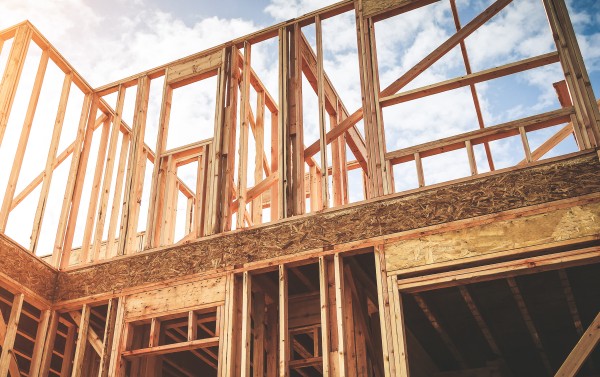Confessions of a Self-Builder: Part 3
What a way to start the year – we finally broke ground on 16 January 2020! The trench fill is complete and foundation blocks are being laid as I write. I’ve also ordered the block and beam floor and that’s due to arrive very soon.
As you can imagine, we were keen to clear the site and start on the foundations but before we broke ground we had to demolish the garage but that was pretty straightforward. I arranged with the previous owner for all services (utilities) to the garage to be cut off and advised them when the demolition would take place. You are required to do this as part of the demolition notice, which I had to complete for the council as the structure is over 58sq m. The notice cost £240. Demolition is dealt with under the Building Act 1984 and you need to provide six weeks’ prior notice to the Local Authority Building Control before demolition can begin.

The demolition cost around £1,200 and as we tore the garages down I tried to salvage what I could. We removed the roof tiles (unfortunately they were not in great shape) and we sent the remaining blocks and masonry to a reclaim skip.
Before demolition could even proceed I had to wait on condition notice approval from our local council to discharge the conditions. I then applied for the Community Infrastructure Levy (CIL) to be suspended. The CIL is a planning charge for the creation of new homes, which is determined by local authorities in England and Wales. Your development may be liable for a charge under CIL if your local planning authority has chosen to set a charge in its area. Once you receive confirmation that your CIL levy has been dropped by the local council, you can start work. If you take one shovelful and they find out, then it will become void and you have to pay the full amount. My planning charge cost around £6,500 – it’s based on square metre. It’s best to talk to your local council for advice.
In my last blog I wrote about the asbestos report. Thankfully, the site was found to be non-asbestos bearing. What a relief! It cost £180 for the actual site investigation and another £120 for the asbestos tests (£60 each test). If I could have proven that the garage was built post year 2000 then a survey wouldn’t have been necessary. Unfortunately, in this case, we weren’t sure when the garages were built and I couldn’t find old planning permission records.
Digging deep
So, back to the foundations…let’s just say we hit a few small snags. Our self-build plot is surrounded by trees so our structural engineer advised that our foundations should go deeper – to approximately 1,300mm instead of the normal 900mm. Trees are bad news for foundations as they can cause unstable foundations when sucking water from the ground. As we dug to 1,300mm we hit running sand and had to stop work immediately. We consulted Building Control as a couple of trenches started to collapse inwards. We noticed that the ground at 900mm deep was solid so we spoke to our Building Control officer and he confirmed that digging to 900mm would be fine. Phew! Although we have hit another small snag – we began placing the blockwork on the foundations and discovered they have been dug in slightly the wrong place so the blockwork is now offset from the foundation pour. It’s not ideal but my friend, our structural engineer, is going to examine this. Any errors will have to be put right… at a cost! Fingers crossed for a positive outcome.

In other (more positive) news, we’ve finally ordered our timber frame. We opted for this kind of system as it’s quick to assemble once it reaches your site (it can take up to three months to manufacture).
It is engineered off-site and will be swift to erect once it reaches our plot, which means our project won’t be slowed down by the weather. The frame will be made from sustainable timber and manufactured in the UK, which means a reduced carbon footprint.
Elsewhere, I’m still on the lookout for tradespeople and it hasn’t been easy. I’ve discovered that day rates wildly fluctuate and I’ve received some silly quotes for joiners ranging from £160 up to £280 per day. I’ve sourced a plumber and am just awaiting his final quote. Thankfully, I am using the same reliable builder who built my first house.
We’ve finally secured our self-build mortgage with Melton Building Society. We used BuildStore for our first build but they worked out to be pricier this time round. We found a better deal with Melton Building Society, however I am pleased we used BuildStore for their expertise as first-time self-builders.
It’s all ‘go, go, go’ but I don’t feel as stressed second time round as we’re renting a house and not crammed into a small flat like last time. Don’t get me wrong, it’s still hard work alongside a full-time job, running my own taxi business and family life. There simply aren’t enough hours in the day but I feel more in control this time!
Read the next installation of James' self-build journey in Confessions of a Self-Builder: Part 4.

Confessions of a Self-Builder: Part 1
New to the Confessions of a Self-Builder series? Take yourself back to James' first blog to get caught up on his project so far.

Timber-frame homes
Is a timber-frame home right for you? Find out more about how to create a hassle-free customised home using a whole-house kit.
